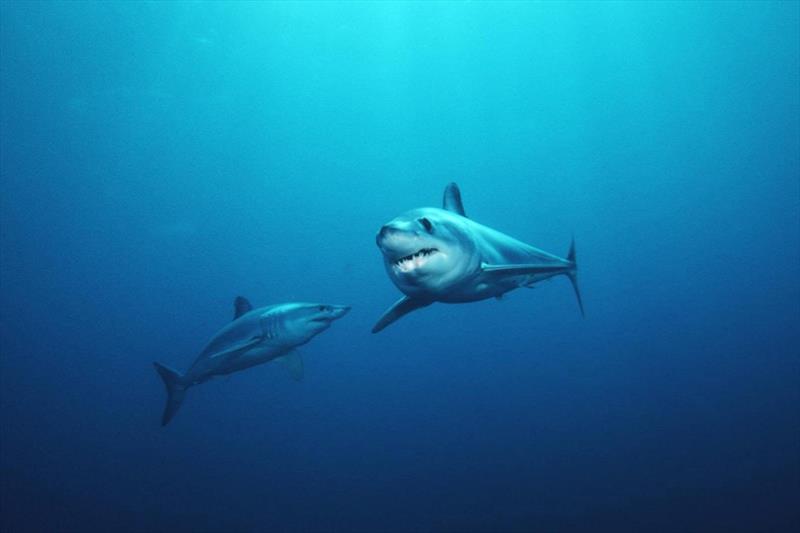
Top five shark videos and more
by NOAA Fisheries 17 Aug 2020 14:39 UTC

Two mako sharks swimming © NOAA Fisheries
This Shark Week, check out our shark features and top five shark videos to get a closer look at how we conserve and study these top ocean predators. Sharks play an important role in the food web, helping to ensure balance in the ocean's ecosystem.
NOAA Fisheries manages commercial and recreational shark fisheries in the Atlantic Ocean. We work with three regional fishery management councils to conserve and sustainably manage sharks in the Pacific Ocean. We conduct research, assess stocks, work with U.S. fishermen, and implement restrictions on shark harvests. Through these actions, we have made significant progress toward ending overfishing and rebuilding overfished stocks for long-term sustainability.
Explore shark stories and videos below to learn more about shark science and sustainability.
Shark features
Sharks in Atlantic Coastal Waters
Sharks are found in coastal waters along the East Coast, and some species populations are on the rise. But your chances of interacting with one are still very low.
Learn more about sharks in Atlantic coastal waters
Are all U.S. sharks overfished?
The majority of sharks harvested in the United States are species with above-target population levels. And we have rebuilding plans for all overfished species.
Learn more about U.S. shark populations
The curious case of a shark and a cephalopod
The Hawaii Community Tagging Program engaged in a collaborative effort to record an amazing encounter.
Learn more about the curious case of a shark and a cephalopod
12 shark facts that may surprise you
Sharks don't have bones but they have great eyesight. Celebrate Shark Week by learning something new about sharks.
Learn more shark facts
Shark Videos
1. Atlantic recreational shark fishing: handling and release
Learn more about prohibited shark identification, including dusky and other ridgeback sharks, and tips for safe handling and release. This video includes information on permitting and regulations for recreational shark fishing in the Atlantic, Gulf of Mexico, and the Caribbean.
Learn more about Atlantic shark fishing
Learn more about catch and release best practices
2. Shark conservation and the spiny dogfish
Tobey Curtis, a NOAA Fisheries shark researcher, talks about the importance of shark conservation and describes his work with spiny dogfish conservation in the Atlantic Ocean. By conducting stock assessments and surveys, we established a recovery plan to rebuild the spiny dogfish population which had been overfished for much of the 1990s and 2000s.
Learn more about Atlantic spiny dogfish
3. A symphony of sharks
NOAA Fisheries proudly presents an ode to sharks and shark research.
4. A mako shark's last meal
See a NOAA Fisheries biologist, Antonella Preti, perform a gut analysis on a 12-foot shortfin mako shark weighing 1,323 pounds. By analyzing the contents of shark stomachs, we help build a database of who eats who eats who in the ocean. This is an essential tool in managing fisheries.
5. A mako shark's last meal - Part 2: The shark bite effect
In 2013, the world record mako shark was caught off the coast of California. Scientists discovered an adult sea lion in its stomach, which you can experience in part 1 above.
Learn more about Pacific shortfin mako sharks